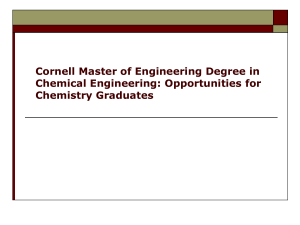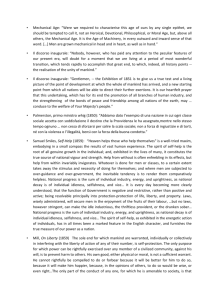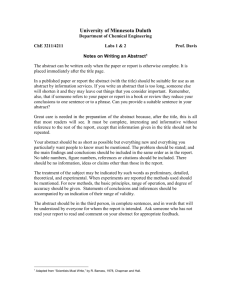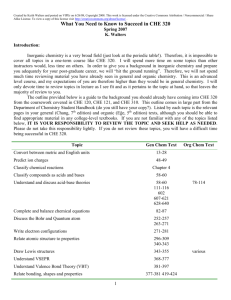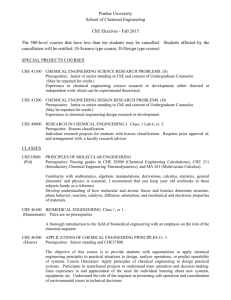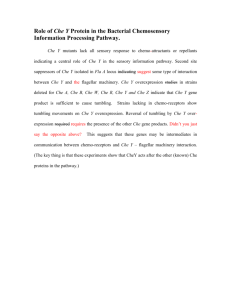CHEMICAL ENGINEERING DEPARTMENT OF CHEMICAL
advertisement
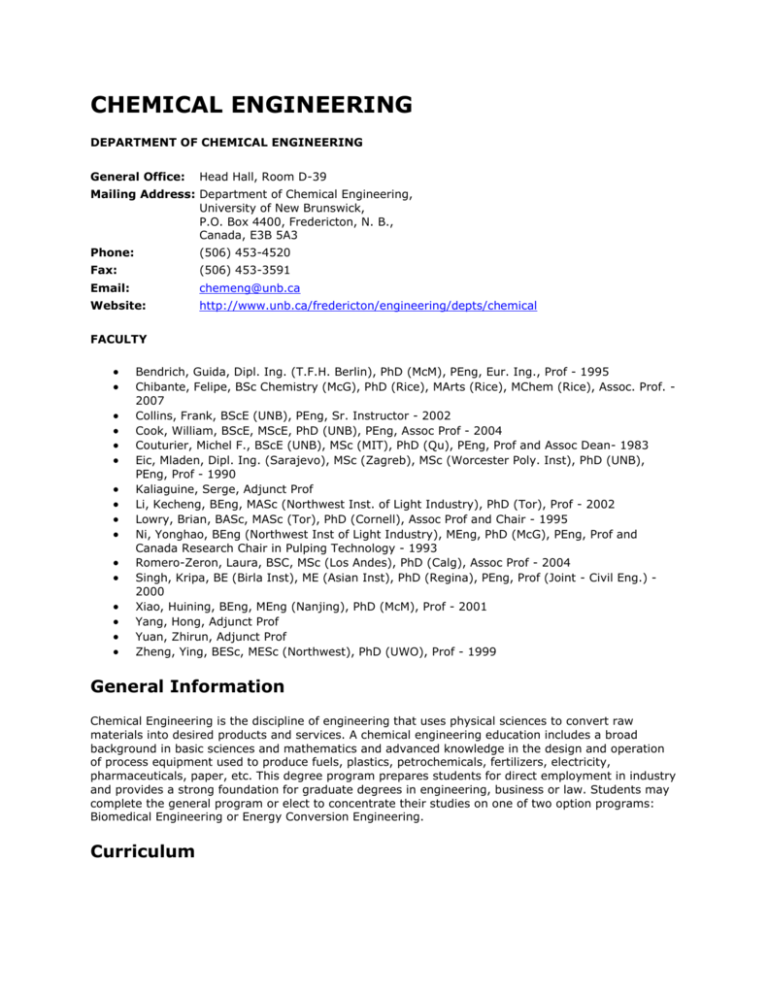
CHEMICAL ENGINEERING DEPARTMENT OF CHEMICAL ENGINEERING General Office: Head Hall, Room D-39 Mailing Address: Department of Chemical Engineering, University of New Brunswick, P.O. Box 4400, Fredericton, N. B., Canada, E3B 5A3 Phone: (506) 453-4520 Fax: (506) 453-3591 Email: chemeng@unb.ca Website: http://www.unb.ca/fredericton/engineering/depts/chemical FACULTY Bendrich, Guida, Dipl. Ing. (T.F.H. Berlin), PhD (McM), PEng, Eur. Ing., Prof - 1995 Chibante, Felipe, BSc Chemistry (McG), PhD (Rice), MArts (Rice), MChem (Rice), Assoc. Prof. 2007 Collins, Frank, BScE (UNB), PEng, Sr. Instructor - 2002 Cook, William, BScE, MScE, PhD (UNB), PEng, Assoc Prof - 2004 Couturier, Michel F., BScE (UNB), MSc (MIT), PhD (Qu), PEng, Prof and Assoc Dean- 1983 Eic, Mladen, Dipl. Ing. (Sarajevo), MSc (Zagreb), MSc (Worcester Poly. Inst), PhD (UNB), PEng, Prof - 1990 Kaliaguine, Serge, Adjunct Prof Li, Kecheng, BEng, MASc (Northwest Inst. of Light Industry), PhD (Tor), Prof - 2002 Lowry, Brian, BASc, MASc (Tor), PhD (Cornell), Assoc Prof and Chair - 1995 Ni, Yonghao, BEng (Northwest Inst of Light Industry), MEng, PhD (McG), PEng, Prof and Canada Research Chair in Pulping Technology - 1993 Romero-Zeron, Laura, BSC, MSc (Los Andes), PhD (Calg), Assoc Prof - 2004 Singh, Kripa, BE (Birla Inst), ME (Asian Inst), PhD (Regina), PEng, Prof (Joint - Civil Eng.) 2000 Xiao, Huining, BEng, MEng (Nanjing), PhD (McM), Prof - 2001 Yang, Hong, Adjunct Prof Yuan, Zhirun, Adjunct Prof Zheng, Ying, BESc, MESc (Northwest), PhD (UWO), Prof - 1999 General Information Chemical Engineering is the discipline of engineering that uses physical sciences to convert raw materials into desired products and services. A chemical engineering education includes a broad background in basic sciences and mathematics and advanced knowledge in the design and operation of process equipment used to produce fuels, plastics, petrochemicals, fertilizers, electricity, pharmaceuticals, paper, etc. This degree program prepares students for direct employment in industry and provides a strong foundation for graduate degrees in engineering, business or law. Students may complete the general program or elect to concentrate their studies on one of two option programs: Biomedical Engineering or Energy Conversion Engineering. Curriculum A minimum of 160 credit hours (ch) is required to obtain a bachelors degree in Chemical Engineering. Twelve of these are technical electives and twelve are complementary studies electives. The degree program may be completed in eight terms of study. Students who participate in the Co-Operative Education (Co-Op)program normally complete the program in five years. Students may opt for a program which spans a longer period of time provided all required courses are taken. Details can be obtained by contacting the Director of Undergraduate Studies. The credit system allows considerable flexibility in designing programs of study but unless care is exercised difficulties may arise with course scheduling. Students are requested to consult with the Academic Advisor or the Director of Undergraduate Studies if they plan to follow a program that differs significantly from the timetable shown in the Program Guide issued at the time of acceptance into the program. Core Courses CHE 1004 Introduction to Chemical Engineering CHE 2004 Fundamentals of Chemical Engineering CHE 2012 Engineering Thermodynamics CHE 2412 Chemical Engineering Lab I CHE 2418 Numerical Methods in Chemical Engineering CHE 2501 / 2506 Materials Science CHE 2525 Fundamentals of Chemical Process Design CHE 2703 Fluid Mechanics CHE 3123 Chemical Engineering Thermodynamics CHE 3304 Heat Transfer CHE 3314 Fluid-Particle Interactions CHE 3324 Staged Processes CHE 3424 Chemical Engineering Lab II CHE 3434 Chemical Engineering Lab III CHE 3505 Chemical Process Design CHE 3601 Process Dynamics & Control CHE 4101 Chemical Reaction Engineering I CHE 4225 Process Design Project CHE 4341 Mass Transfer Operations CHE 4404 Chemical Engineering Lab IV BIOL 1001 Biological Principles I CHEM 1982 General Applied Chemistry CHEM 1987 General Applied Chemistry Laboratory CHEM 2401 Organic Chemistry for Life Sciences CHEM 3621 Electrochemistry & Chemical Kinetics CHEM 3886 Analytical Chemistry for Chemical Engineering CHEM 3897 Organic Chemistry for Chemical Engineering CHEM 4886 Physical Chemistry for Chemical Engineering PHYS 1081 Foundations of Physics for Engineers CS 1003 Introduction to Computer Programming EE 1813 Electricity & Magnetism ENGG 1001 Engineering Practice Lecture Series ENGG 1003 Engineering Technical Communications ENGG 1015 Introduction to Engineering Design and Problem Solving ENGG 1082 Mechanics for Engineers ENGG 4013 Law & Ethics for Engineers MATH 1003 Introduction to Calculus I MATH 1013 Introduction to Calculus II MATH 1503 Introduction to Linear Algebra MATH 2513 Multivariable Calculus for Engineers MATH 3503 Differential Equations for Engineers STAT 2593 Statistics for Engineers Electives TECHNICAL ELECTIVES The Chemical Engineering degree program consists of a minimum of 12 ch of technical electives chosen from the list of courses below. Technical elective courses in chemical engineering are offered each year, and specific courses are offered on a rotating basis. Students should consult with the Department for more information on planned course offerings. The Department also offers two option programs within its technical elective stream: Energy Conversion Engineering , and Biomedical Engineering . These options are offered to students wishing to have an area of specialization within the chemical engineering discipline. Those who successfully complete an option will receive a special notation on their university transcript upon graduation. More information on these options is given below. Students who transfer to UNB Chemical Engineering with a minimum of one year of university-level study may take CHE 1024 (14ch),Elements of Mass and Energy Balances, in place of CHE 1004 (3ch) , CHE 1024 must be taken concurrently with CHE 2004(3ch) and students electing to take CHE 1024 are required to complete a minimum of 14 ch of technical electives. CHE 4423 Chemical Engineering Practice School CHE 4724 Special Topics in Chemical Engineering (3 ch) CHE 4734 Special Topics in Chemical Engineering (2 ch) CHE 4744 Special Topics in Chemical Engineering (1 ch) CHE 4814 Chemical Engineering Report CHE 4914 Thesis CHE 5114 Chemical Reaction Engineering II CHE 5224 Applied Petroleum Reservoir Engineering CHE 5234 Oil & Gas Process Engineering CHE 5244 Enhanced Oil Recovery Processes CHE 5254 Polymer Reaction Engineering & Processing CHE 5264 Oil Sands Technology CHE 5313 Energy and the Environment CHE 5314 Chemical Process Industries CHE 5344 Combustion CHE 5413 Air Pollution Control CHE 5434 Transport Phenomena CHE 5522 Nanotechnology CHE 5524 Mathematical Methods in Chemical Engineering CHE 5534 Process Identification for Advanced Control CHE 5614 Chemical Process Control CHE 5714 Electrochemical Engineering CHE 5744 Steam Supply Systems CHE 5754 Steam & Gas Turbines CHE 5764 Special Topics in Power Plant Engineering CHE 5804 Nuclear Chemical Processes CHE 5824 Corrosion Processes CHE 5834 Nuclear Engineering CHE 5844 Nuclear Safety & Reliability CHE 5854 Nuclear Heat Removal CHE 5877 Advanced Nuclear Systems CHE 5913 Pulp Production CHE 5923 Papermaking CHE 5933 Bio-refining: Principles, Processes and Products BIOL 2033 Biochemistry (3 ch) CE 5421 Water Quality and Treatment (4 ch) CE 5432 Wastewater Treatment and Pollution Control (4 ch) ME 5473 Energy Management COMPLEMENTARY STUDIES PROGRAM Complementary studies are an important element in engineering education. The Chemical Engineering degree program consists of a minimum of 12 ch of Complementary Studies electives satisfying each of the following core categories: Humanities – minimum 3ch (Sociology, Anthropology, History, Classics, Philosophy, Political Science) Business/Management – minimum 3ch (Administration, Tech. Management and Entrepreneurship, or select Economics courses) Non-Language – minimum 3ch (Humanities, Business or any PSYC, RLS, ENVS, ENR, IDS, RCLP, ARTS, WLCS) Other Approved – minimum 3ch (course approved by the Director of Undergraduate Studies) The Department strongly encourages its students to obtain business-related education through the complementary studies stream and to pursue a diploma in Technology Management and Entrepreneurship , which is offered by the Faculty of Engineering. For more information on integrating this diploma with the undergraduate degree in chemical engineering, please contact the Director of Undergraduate Studies. DISTANCE EDUCATION Select Chemical Engineering courses are available by distance education. Currently these courses include CHE 2501 (Fall or Winter terms), and CHE 2418 (may be taken at any time). Students in fulltime attendance are not normally permitted to take online courses while a classroom-based version of the course is available. Students wishing to take courses from any outside institution as credit towards their degree must receive approval from the Director of Undergraduate Studies prior to enrolling in the course at the outside institution. INTERNATIONAL EXCHANGE PROGRAM The Department offers an opportunity for its students to study abroad and receive course credits towards an undergraduate degree. Students interested in international study must be in good academic standing and receive prior approval from the Department for degree transfer credit. Interested students should consult with the Director of Undergraduate Studies to obtain more information. Energy Conversion Engineering Option in Chemical Engineering The chemical engineer must include environmental stewardship as a design requirement in the conversion of energy resources into commodity products and services. This option places emphasis on emerging technologies and societal issues in the energy and environment sector within chemical engineering. The directed path consists of 1 required course, 1 complementary studies elective and 3 technical elective courses (minimum total of 15 ch) selected from the approved lists below. Students may elect to receive a further specialization within the ECE Option by focusing their technical electives in nuclear & power plant techology, oil & gas processing or environmental disciplines. To participate in the option students must obtain Department approval. Air Pollution Control Core: CHE 5313 Energy and the Environment Complementary Studies Elective: (1 course from the following list): ECON 3865 Energy Economics ENVS 2023 Understanding Environmental Issues ENVS 4002 Stakeholder Approaches to Environmental Problem Solving ENR 1001 Resource Management Issues ENR 2021 Natural Resource Management, Institutions, Policy, Governance ENR 2541 Climate Change HIST 3925 Technology and Society Technical Elective: (3 courses from the following list): Oil & Processing CHE 5234 Oil Refining and Natural Gas Processing CHE 5244 Enhanced Oil Recovery CHE 5264 Oil Sands Technology CHE 5933 Biorefining: Principles,Processes and Products CHE 5264 Oil Sands Technology Nuclear & Power Plant Technology CHE 5344 Combustion CHE 5744 Steam Supply Systems CHE 5824 Corrosion Processes CHE 5834 Nuclear Engineering Environmental CE 5432 Wastewater Treatment and Pollution Control CE 5314 Chemical Process Industries CE 5413 Air Pollution Control ME 5473 Energy Management ME 5933 Industrial Ecology Students with special interest in environmental studies are encouraged to pursue a minor or secondary major in this area through the university’s Environmental Studies Program, administered by the Faculty of Forestry and Environmental Management. The Department also encourages interested students to pursue a Masters of Engineering degree in environmental studies after graduation. Biomedical Engineering Option in Chemical Engineering Biochemical Engineering is an exciting and growing area of specialization within the Chemical Engineering discipline. The Biomedical Engineering Option in Chemical Engineering is a study path for students wishing to pursue careers in medicine or the health sciences industry. Students who plan on attending medical school are encouraged to seek advising immediately upon entrance into the degree program. To complete the option program, students must obtain Departmental approval and complete one core course (which is normally offered every year), and 3 technical electives chosen from the list below. Only biomedical option students may use these courses towards the technical elective degree requirements. Required Course: APSC 3953 Basis of Biomedical Engineering (3 ch) Technical Electives: BIOL 2033 Biochemistry (3 ch) BIOL 2043 Cell Biology (3 ch) BIOL 2053 Genetics (3 ch) BIOL 2073 Bacteriology (5 ch) BIOL 2753 * Introduction to Human Anatomy (3 ch) BIOL 2792 Human Physiology - Systems (3 ch) CHEM 3003 ** Biocomputing in Drug Design I (5 ch) CHEM 4523 (3 ch) Medicinal Chemistry CHEM 4003 ** Biocomputing in Drug Design II (4 ch) KIN 2062 * Introductory Biomechanics (3 ch) KIN 3061 * Advanced Biomechanics (4 ch) KIN 4163 * Workplace Ergonomic Design And Analysis (3 ch) ME 5913 Biomechanics (4 ch) PHYS 5993 Magnetic Resonance Imaging (3 ch) * some option courses require that BIOL 2753 be taken as a pre-requisite. ** some option courses require that BIOL 1001 be taken as a pre-requisite. Students with special interest in Biology and Biochemical Engineering are encouraged to pursue a Minor in Biology through the Faculty of Science. Such students should seek advising from the Director of Undergraduate Studies to embark upon this path as soon as possible in the degree program.

